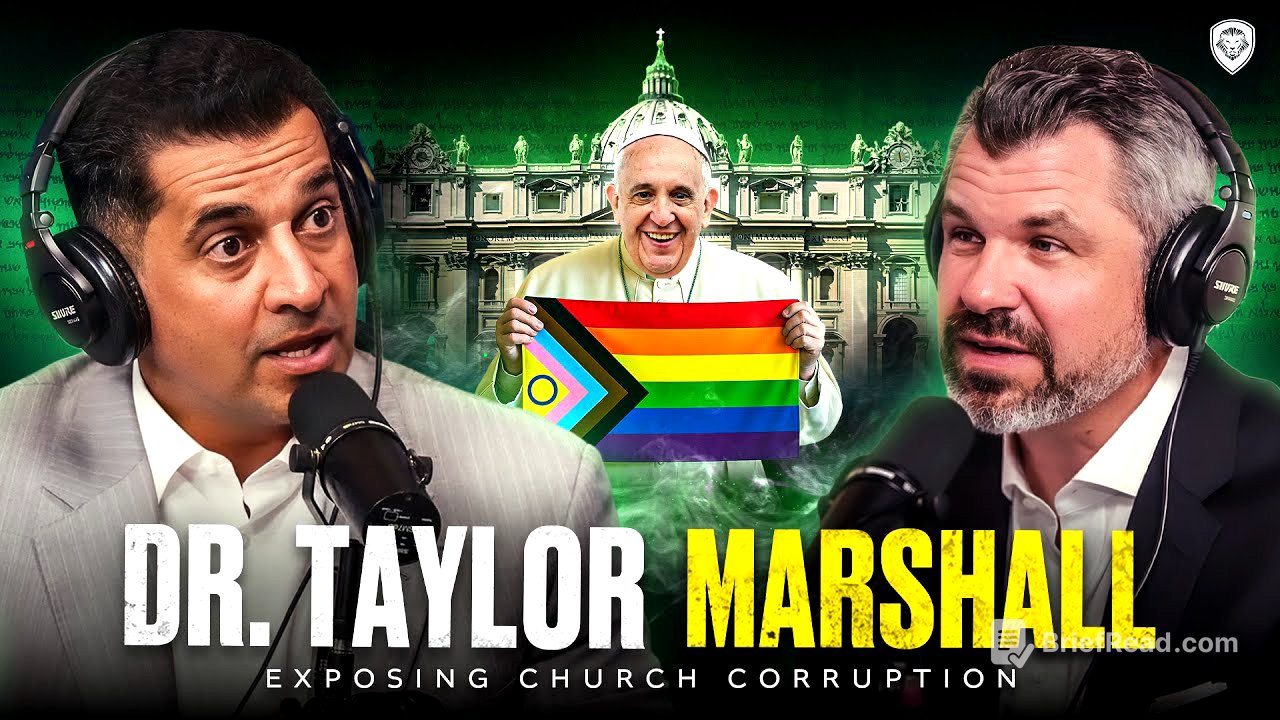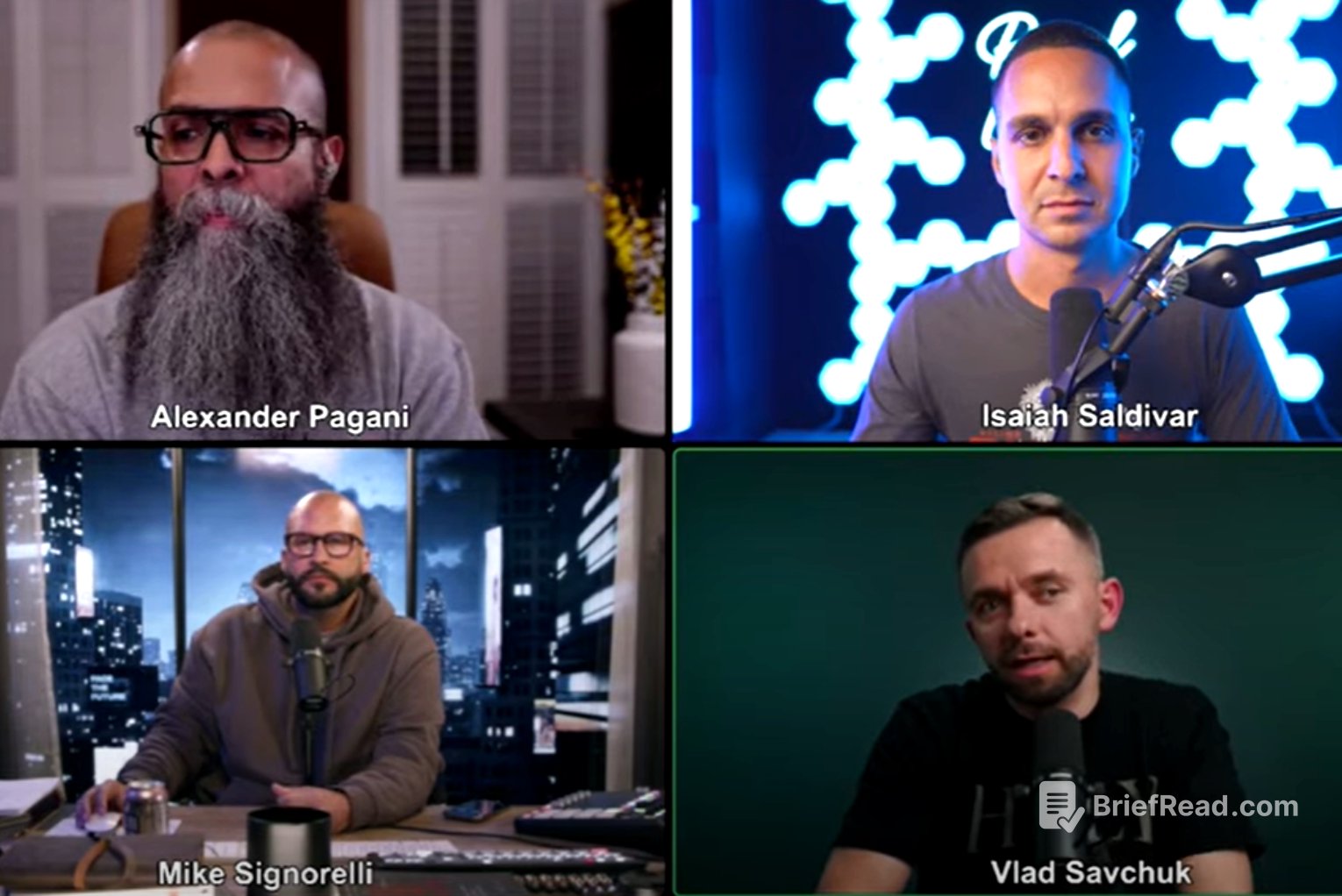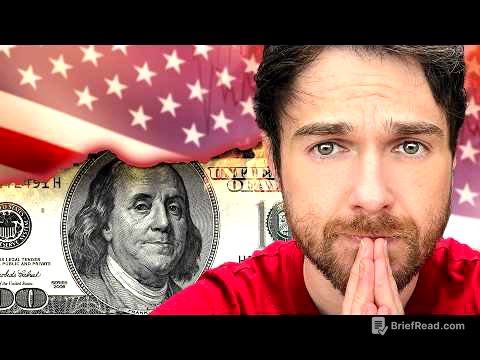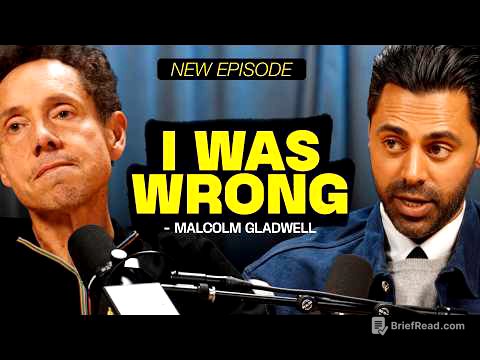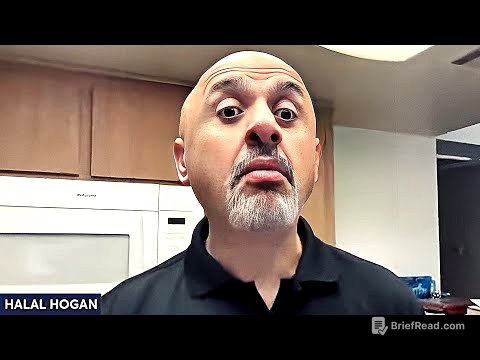TLDR;
In this PBD Podcast episode, Patrick Bet-David interviews Dr. Taylor Marshall, a Catholic theologian and author, about his journey from no religious background to becoming a Catholic convert, the challenges facing Christianity today, and the role of faith in society. They discuss the importance of strong discipleship, the infiltration of secular ideologies into the Church, and the declining birth rates in Christian communities. The conversation also touches on the rise of Islam, the controversy surrounding Israel, and the need for Christians to actively engage in culture and politics.
- Dr. Taylor Marshall's conversion story from no religious background to becoming a Catholic.
- Challenges facing Christianity today, including cultural opposition and declining birth rates.
- The role of faith in society and the need for Christians to actively engage in culture and politics.
- The rise of Islam and the controversy surrounding Israel.
- The importance of strong discipleship and the infiltration of secular ideologies into the Church.
Introduction [0:00]
Patrick Bet-David introduces Dr. Taylor Marshall, highlighting his background, including his PhD in philosophy and his conversion from being an Episcopal priest to a Catholic. He also mentions that Dr. Marshall has eight children and that his wife is a big fan of the PBD Podcast.
From No Religion to Catholicism [2:37]
Dr. Marshall shares his personal journey to Catholicism, beginning with his childhood curiosity about God and the Bible. He recounts how an encounter with a Texas Rangers player who shared a Bible verse sparked his interest in Christianity. He became an Episcopalian priest but eventually converted to Catholicism after realizing the Catholic Church's strong stance on pro-life issues and its rich theological tradition. A visit to Rome and attending a mass with Pope Benedict solidified his decision to convert.
Theology and the Emotional Push [6:18]
Dr. Marshall explains that his conversion was primarily driven by theology, particularly his study of the early church fathers. He found that their teachings on the Eucharist, bishops, priests, and deacons resonated with him more than his experiences in the Episcopal Church. The emotional aspect that solidified his decision was the Catholic Church's strong defense of the unborn and vulnerable.
The Current Pope and the Crowds in Rome [8:35]
Dr. Marshall shares his experience of seeing the current Pope in Rome and notes the large crowds, suggesting renewed optimism after disappointment with the previous pope. He mentions his book "Infiltration," which is critical of Pope Francis, and discusses the significance of visiting the catacombs, where thousands of early Christians were martyred.
Challenges of Being a Christian Today [10:43]
Dr. Marshall argues that it is harder to be a Christian today than it was 100-200 years ago due to the pervasive influence of social media and anti-Christian viewpoints in culture. He emphasizes the need to actively catechize children and teach them about their faith, as sending them to Sunday school is no longer sufficient. He also discusses the power of propaganda and how it is easier to confuse and divide people today through various media channels.
Fighting Against Weak Thinking [15:34]
Dr. Marshall discusses how the use of AI tools like ChatGPT can reduce critical thinking skills, making people more susceptible to negative propaganda. He introduces his book "Christian Patriot," which outlines 12 strategies for Christians to positively impact society. He stresses that being a Christian involves transforming both oneself and society, not just personal faith.
The New Secular Religion [18:31]
Dr. Marshall argues that a new secular religion has emerged, filling the vacuum left by Christians who retreated from the public square. This secular religion has its own dogmas, clergy, and rituals, and it actively promotes its values in culture and politics. He urges Christians to reclaim the public square and uphold Christian standards of virtue, ethics, and natural law.
Islam and Christian Fear [21:58]
Dr. Marshall discusses why Christians are often afraid of Islam, citing its history of violence. He argues that Christians need to integrate their faith with their citizenship and engage in foreign policy based on their beliefs. He also notes the declining birth rates in Christian communities and the need to promote marriage and family.
The Importance of Conversion and Strong Discipleship [26:56]
Dr. Marshall emphasizes the importance of converting people to Christianity and creating strong disciples who are fully committed to Jesus Christ. He criticizes the weakness and sloppiness in some Christian discipleship, contrasting it with the strength and audacity often seen in Islam. He also discusses the infiltration of the Catholic Church by those seeking to undermine it from within.
Pope Francis and Modernism [32:36]
Dr. Marshall discusses the division within the Catholic Church between traditionalists and modernists, with Pope Francis representing the modernist approach. He argues that this approach involves caving to contemporary trends and compromising on core beliefs. He recalls his initial unease when Pope Francis was elected and notes the questionable statements and policy changes made during his papacy.
Islam and Christianity Today [36:53]
Dr. Marshall foresees continued growth for Islam in America and warns that if things stay the same, Christians will lose ground. He emphasizes the need for interior conversion and external expression of faith, as well as addressing issues like abortion, contraception, and feminism. He also stresses the importance of having real conversations about marriage, family, and the purpose of procreation.
Selling Marriage and Family [42:37]
Dr. Marshall discusses the need to better "sell" the benefits of marriage and family to young people. He argues that parenthood, while challenging, is ultimately rewarding and that delayed gratification is a key aspect of the Christian life. He also emphasizes the importance of having a right relationship with God and a transcendent view of life.
The Joys and Benefits of a Large Family [46:29]
Dr. Marshall shares his personal experience of having eight children, highlighting the joys and challenges of raising a large family. He notes that while it can be difficult, it is also the most rewarding thing he has ever done. He also discusses the benefits of being part of a large community where children learn to navigate relationships and develop important life skills.
Contraception and Traditional Catholic Teachings [48:16]
Dr. Marshall discusses the Catholic Church's controversial stance against contraception, which was reaffirmed by Pope Paul VI in 1968. He explains that while many Catholics do not follow this teaching, it remains on the books. He also notes the higher birth rates among traditional Catholics who adhere to this teaching.
The Lambeth Conference and the Church of England [51:31]
Dr. Marshall explains that the Anglican Church of England first allowed contraception for married couples at the Lambeth Conference in 1930. He contrasts this with the Catholic Church's continued opposition to artificial contraception, arguing that it works against nature and undermines the procreative element of marriage.
Feminism and Contraception [55:34]
Dr. Marshall references Tucker Carlson and Jordan Peterson, who have discussed the impact of contraception on society. He notes that the birth control pill gave women the power to enter the workplace and prevent pregnancy, which led to the rise of feminism. He wonders if there will be a flip in the future, with a renewed emphasis on having large families.
Joe Rogan and the Trajectory Away From Degeneracy [56:46]
Dr. Marshall discusses Joe Rogan's recent interest in religion and notes his trajectory towards more Christian and conservative viewpoints. He suggests that Rogan, like many others, is realizing the emptiness of a degenerate lifestyle and seeking something more transcendent. He also shares his personal conversion story and the challenges he faced in turning away from a selfish life.
The Importance of a Vertical Relationship with God [1:14:01]
Dr. Marshall recounts advice he received from Pastor Mano, who emphasized the importance of a vertical relationship with God, rather than a horizontal one based on other people. He also recommends three books for young men: "Samson Syndrome," "King, Lover, Warrior, Magician," and "No More Mr. Nice Guy." He adds that every young man should read the Book of Proverbs in the Bible.
Stoicism and Christianity [1:18:04]
Dr. Marshall discusses the history and principles of stoicism, noting its appeal to masculine men as a pre-Christian philosophy of virtue and self-control. He argues that stoicism can be a helpful tool for young men, but it should be balanced with faith in Christ. He also shares a clip of a Jewish speaker who argues that women support men's ambitions and pride, leading them astray.
Candace Owens and Feminism [1:28:37]
Dr. Marshall shares a clip of Candace Owens debating feminism, arguing that it was funded by the CIA and has created class warfare within the home. He agrees that feminism has not made the world a better place and that it is important to define matrimony, man, and woman according to Genesis chapter 3.
The Unsustainable Nature of Low Birth Rates [1:33:55]
Dr. Marshall emphasizes that low birth rates are not sustainable and that a society with a birth rate of 1.6 is doomed. He expresses optimism that things are changing and that more people are rejecting feminism and embracing traditional values.
Islam and Its Growth [1:35:11]
Dr. Marshall discusses why Islam has grown so rapidly, despite its problematic aspects. He suggests that it may offer a sense of stability and truth compared to previous religions. He also notes that Muslims often think about politics and culture theologically, which may give them an advantage in shaping society.
The Controversy Surrounding Israel [1:42:32]
Dr. Marshall shares his position on the controversy surrounding Israel, drawing from traditional Catholic teaching. He emphasizes the importance of humility and respect towards Jewish people but affirms that Christians are the chosen people of the new covenant in Jesus Christ. He criticizes dispensationalism, the belief that God has separate plans for Jews and Christians, and warns against blindly supporting Israel based on this theology.
Unifying the Divide [1:47:48]
Dr. Marshall admits that there is no easy solution to unify the divide between those who support Israel and those who do not. He acknowledges that the Israeli position is firm and that there is no compromise.
Conclusion and Gift [1:48:51]
Patrick Bet-David thanks Dr. Marshall for coming on the show and expresses his enjoyment of the conversation. Dr. Marshall gifts him a rosary blessed by the Pope and a signed copy of his book, "Christian Patriot." The episode concludes with a discussion of Harrison Butker, who wrote the foreword to the book.
